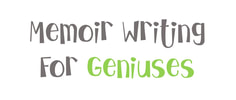Struggling with your memoir?
|
|
|
People tend to have strong feelings about writing dialogue. Some writers love it. Others worry that they are terrible at it. Whatever your opinion on adding dialogue to your book, keep this in mind: Dialogue isn’t as important as you probably think it is. Think of dialogue as spice. It can add flavor to your book, but you can’t make a meal out of only spice. One of the biggest mistakes I see writers make is putting important information in dialogue. The writer uses tons of dialogue to create a scene and tell a story. Here is an example of what I mean by this:
“The trail ahead of us looks steeper than in the picture,” I say. “We should be fine,” Ari replies. “It's a hike of just two miles. Thousands of middle-aged German tourists climb to the top every year.” “Wasn't this a place where two hikers fell off the cliff last year?” I saw it on the news. “You are thinking of Devil's Canyon. It's in Wyoming, hundreds of miles away from here,” Ari explains. “Is that the place where there was a landslide two years ago?” “Yes. Twenty-two people were killed.” In this version, we get lots of info, but how much of what you just read did you actually remember? Honestly, I felt like I just overheard a very boring conversation. But I didn’t know what I was supposed to take away from it. I was bombarded with information. *** Here is the same story with all of the dialogue stripped out. Instead, I get information across by using narration. See if you feel how much richer and more interesting this is: The trail ahead of us looks steeper than in the picture. Suddenly, I'm not so sure about this whole excursion. I imagine myself taking one wrong step and plunging into the ravine below. Ari tells me that it's fine, that I have nothing to worry about. He has been doing this for years, and no one has ever gotten hurt, not a single one of the thousands of middle-aged German tourists who climb to the top each year. The place looks strangely familiar to me, which seems ridiculous. After all, this is my first time in Colorado. I tell myself that all forest trails look the same. And then I remember I saw it on the news. Two teenagers were hiking here last year, and one of them lost her footing and plunged to her death. Ari looks at me like I'm making a big deal out of nothing, and informs me that I've confused this place with Devil's Canyon, which is located in Wyoming hundreds of miles away from here. Of course I've heard of Devil's Canyon. It was an hour drive from my house and everyone talked about it in hushed tones. There was some big accident there when I was a kid, a landslide plowed through trees and boulders and wound up taking the lives of twenty-two people. The image has stayed with me for weeks. And I get the same uneasy feeling now, is this the right thing to do? A little voice is telling me to turn around and go back to the car. That I can come back and do this anytime that it shouldn't happen today. *** Narration, in general, is a lot more interesting than dialogue. If you have to pick one, I would always go with narration. In fact, dialogue on its own doesn’t provide as much information as you might think. Let me give you an example to show you what I mean. As you read the lines of dialogue below, think about how much you actually learn about the two people in this scene. What is their relationship like? How do they feel about each other? “You look terrible,” Diego told me. “I tried to put makeup on,” I replied. “Yeah, didn't work.” “I should just give up.” “If I were you, I would just stop looking in the mirror.” *** So from this dialogue, you might assume that Diego isn’t a very nice person. But are you sure? Take a look at how adding narration totally changes your opinion of Diego and of what is going on in this scene. (I haven’t changed a word of the original dialogue.) “You look terrible,” Diego told me. Noah had passed away a day before and I'd spent the night crying and downing Xanax. I knew my eyes were puffy and red. But I also knew that Diego could take it. He had seen me at my worst and it never made me feel like I needed to pretend that everything was okay. “I tried to put makeup on,” I replied. And I had. But it only made the situation worse. Now that the Xanax had worn off, my hand would stop trembling. I was suddenly like a five-year-old who couldn't paint within the lines. My lips were less Coco Chanel, and more Bozo the Clown.” “Yeah, didn't work.” Diego was stating the obvious, and it made both of us laugh. “I should just give up.” I couldn't help but play along with the game that Diego had started. I didn't know how he did it, but I was already feeling a little bit better. “If I were you, I would just stop looking in the mirror.” Diego wiped the lipstick off my face with the hem of his T-shirt. It was such a loving gesture that I knew that everything would be okay. *** Still worried about writing dialogue? You shouldn’t be. You should only be worried if your dialogue is drowning out the narrator’s voice in your book. Happy writing!
0 Comments
Leave a Reply. |
AuthorA Random House author offers tips on writing your own memoir. Archives
July 2024
Categories |
|
|
Memoir Writing for Geniuses.
All rights reserved. |


 RSS Feed
RSS Feed